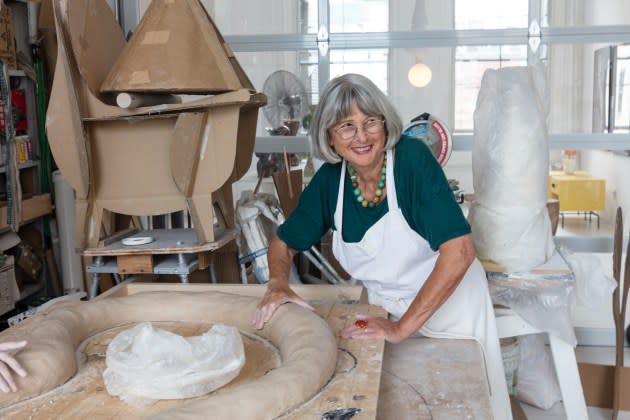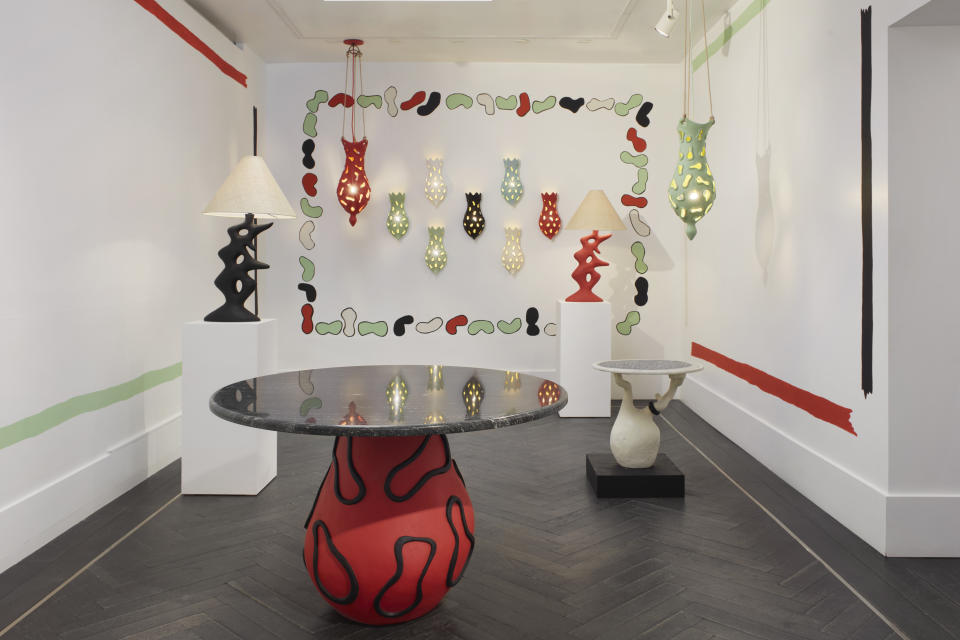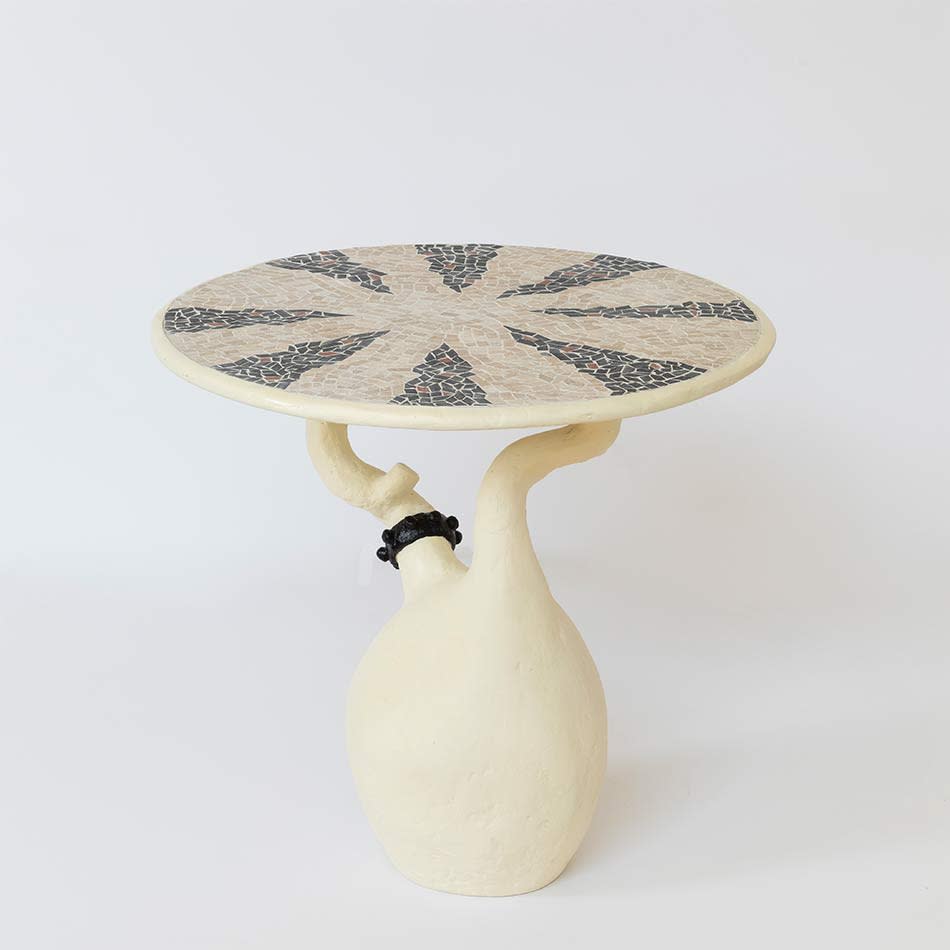The Animated Aesthetic of Elizabeth Garouste
- Oops!Something went wrong.Please try again later.
- Oops!Something went wrong.Please try again later.
- Oops!Something went wrong.Please try again later.

Elizabeth Garouste eschews the intersection of technology and design.
“I’m incapable of that,” Garouste said. “I always go back to how I have always worked. Even if the world moves on with technology and new ways, I stay with the old way of creating. Maybe if I was younger, I would initiate to the new ways, this technology.”
More from WWD
CAD or AI don’t enter the conversation. “For me, it’s about staying attached to craft and craftsmanship.”
Garouste, a pioneer since the 1980s in bridging furniture design and art, is speaking from her studio in Paris, through a translator. It’s a week before Thursday’s opening party for her exhibit at the Ralph Pucci International gallery in London at 18 Albemarle Street, in conjunction with the PAD London fair for 20th-century and contemporary design, and the Frieze Art Fair.
The exhibit is aptly called “Beans” to reflect the whimsy and fun inherent in the collection of free-flowing home furnishing designs. There’s a side table with branch-like limbs connecting the asymmetric base to the mosaic top; hanging lamps with holes suspended by cords; a sculptural table lamp with a raffia shade, and a curvy mirror shaped like a big bean. There are also sconces, chandeliers, a console and a dining table with one or two bases for varied size.
“It’s all very organic,” Garouste said.
Her methods may be unchanged from the past, yet the finished products always seem fresh. And Garouste’s signature style — vivid colors, unconventional shapes and unusual mixes of natural materials — for decades has been conspicuous in the world of interior design otherwise dominated by muted colors and traditional silhouettes.
Pucci first exhibited “Beans” last May at his New York City showroom, though some of the colors in the London presentation are different. “Beans” will travel to Pucci’s new gallery in the Wynwood section of Miami in December during Art Basel. Garouste has created a huge 100-foot by 16-foot mural on the facade. In April, the exhibit will travel to Pucci’s gallery in Los Angeles.
“This collection is very special. It’s in plasterglass,” Garouste said “The highlight is really the material. You can shape and model it how you want, like clay or bronze. It’s not plaster, which is very fragile. It’s reinforced for durability, but it maintains the look of plaster, which everybody appreciates, and has the ability to take color beautifully.”
It was her first time working in plasterglass, which Garouste took to a new level with her signature use of color in a medium typically rooted in light gray or black.
What’s also special about the collection is that Garouste, in the summer of 2022, created it at Pucci’s sculpture studio in Manhattan, at 44 West 18th Street, also the site of Pucci’s production workroom and showroom. She worked with Pucci’s in-house sculptor Michael Evert, his assistant and her assistant.
“I really enjoyed the hands-on experience working in clay first, then in plasterglass. I much prefer to work with my hands as opposed to having a third party execute my designs because during the process of creation you can change it,” Garouste said. “Working in the sculpture studio I could see if the proportions were off. I could make tweaks.”
The artists explored ideas on the spot, improvising. “There was a lot of freedom in the creative process and a lot of trust by Ralph,” Garouste said. “I loved being there and seeing the process through. When it comes to wood and metal, for example, it’s not always possible” since often in those cases, she explained, her design drawings get submitted to a woodworking or metal shop for production.

Garouste said she’s long been inspired by colors and shapes, especially from artists like Matisse and by Middle Eastern culture, “those very warm colors there.” In Belleville, on the east side of Paris where her studio is located, she finds “a mix of religions and cultures, and lots of Chinese and Indian shops, with colors, textures and materials that do inspire me.”
She’s drawn to materials found in nature. Of course, she credits her husband of 53 years, Gerard Garouste, a leading contemporary French artist known for his swirling allegorical and mythological paintings and strong use of color.
When talking about herself, a Canadian movie called “Beans” comes to mind. “It’s all about a girl at that stage between childhood and adulthood. I have that same mindset, and with that comes some anxiety, anxiousness and something from deep inside that needs to go out, and also a wonderful sense of humor, a joie de vivre.”
Garouste’s parents owned a shoe manufacturer, Tibury, where for several years she designed shoes for Yves Saint Laurent, Sonia Rykiel and Cacharel. She studied at the École Camondo where her classmates included architect Philippe Starck, artist Sophie Calle and her future husband. She created costumes for theater productions by her friend, the playwright and director Jean-Michel Ribes. Subsequently she shifted to designing home furnishings and formed a partnership in 1980 with another designer, Mattia Bonetti, introduced to her by her husband, who sought help with the décor for a Paris club.
In 1987, Garouste and Bonetti were hired by Christian Lacroix to design his stores. The partners’ palette of bold colors and shapes for Lacroix was a fantastic and sophisticated departure from the understated, hushed interior design seen at other designer shops. The Garouste & Bonetti design duo became well known on the international art/design scene for inventive and quirky creations in the 1980s and ’90s, which have appeared in leading museums around the world, including the Victoria & Albert Museum, the Centre Georges Pompidou and the Guggenheim Museum, among others. Garouste’s partnership with Bonetti lasted 22 years.
Her ongoing collaboration with Pucci, who was familiar with Garouste’s work and particularly impressed by the Lacroix interiors, began about 14 years ago when Pucci staged Garouste’s first solo exhibit in the U.S. “In the past, Elizabeth would give me ideas and I would select the pieces, which were made in France,” Pucci said. But that process changed when Garouste in the summer of 2022 worked at Pucci’s sculpture studio creating “Beans.”
“It was challenging for us to work in this new color range, but everything she did with us became these visual wows,” Pucci said. “She got all these ideas and we ran with them. With Elizabeth, it’s really an explosion of color. In London, she has changed the whole mood of the space,” Pucci said. “She’s very clear in her message. She’s truly an original thinker.”


